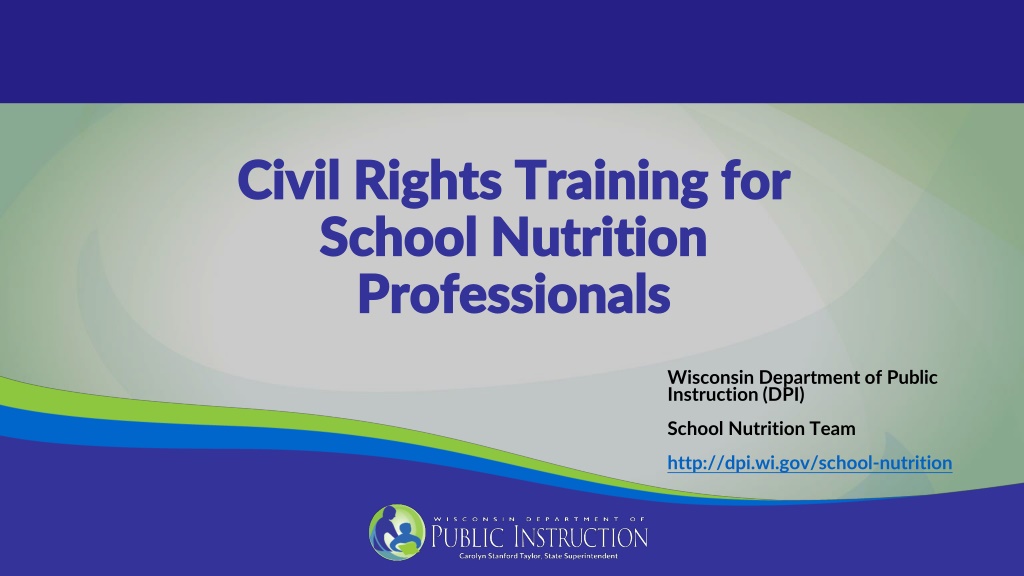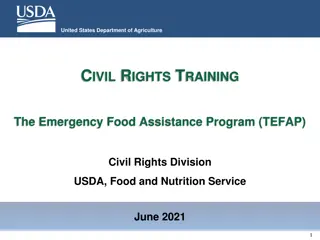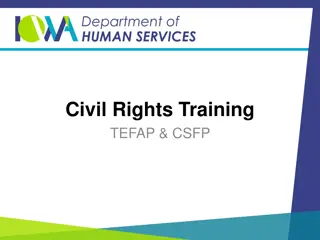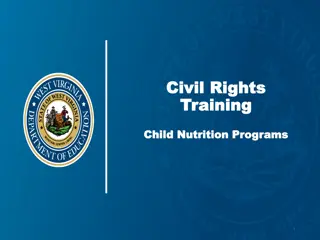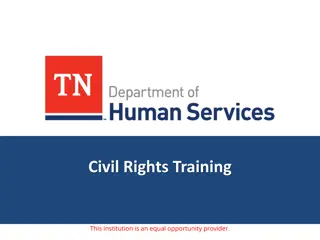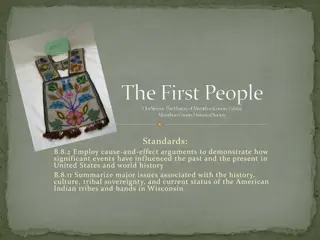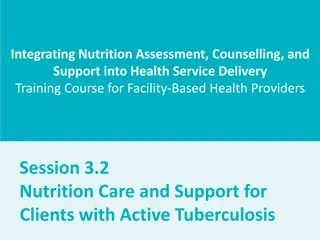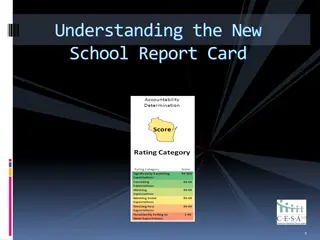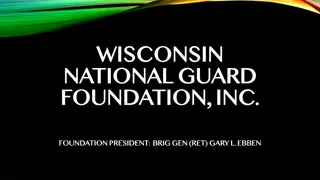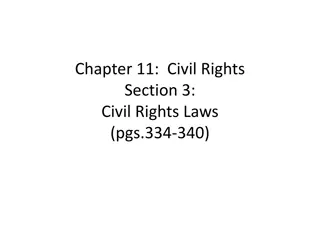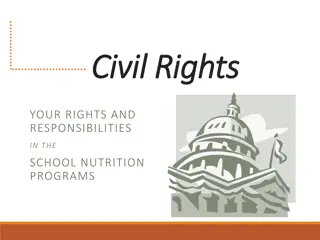Civil Rights Training for School Nutrition Professionals in Wisconsin
This comprehensive civil rights training program by the Wisconsin Department of Public Instruction is essential for school nutrition professionals to understand and comply with federal laws prohibiting discrimination based on protected classes. The training covers the importance of notifying the public of program benefits, including requirements and public notification obligations. Additional Wisconsin protections, such as marital status, parental status, sexual orientation, pregnancy, religion, creed, and ancestry, are also highlighted.
- Civil Rights Training
- School Nutrition
- Wisconsin Department of Public Instruction
- Discrimination Laws
- Public Notification
Download Presentation

Please find below an Image/Link to download the presentation.
The content on the website is provided AS IS for your information and personal use only. It may not be sold, licensed, or shared on other websites without obtaining consent from the author. Download presentation by click this link. If you encounter any issues during the download, it is possible that the publisher has removed the file from their server.
E N D
Presentation Transcript
Civil Rights Training for Civil Rights Training for School Nutrition School Nutrition Professionals Professionals Wisconsin Department of Public Instruction (DPI) School Nutrition Team http://dpi.wi.gov/school-nutrition
Why Civil Rights Training? Why Civil Rights Training? USDA requires civil rights training on an annual basis so that all levels of administration of programs receiving Federal financial assistance understand civil rights related laws, regulations, procedures, and directives.
Federal Law Federal Law Prohibits Discrimination on the Basis of These Protected Classes: Color National Origin Race Sex Age Disability
Additional Wisconsin Protections Additional Wisconsin Protections Marital Status Parental Status Sexual Orientation Pregnancy Religion Creed Ancestry
Notifying the Public of Program Benefits Notifying the Public of Program Benefits and Requirements and Requirements Program Availability Complaint Information Nondiscrimination Statement
Public Notification: Program Availability Public Notification: Program Availability Child Nutrition Programs must include a public notification system to: Inform surrounding areas that your school or agency participates in the Child Nutrition Programs Reach as many potential participants as possible Provide the steps needed to participate
Public Notification Requirements Public Notification Requirements The Income Eligibility Guidelines The benefits and services offered Program availability, location, and hours of service Application rights and responsibilities The procedures for filing a complaint Nondiscrimination statement Any other programmatic changes
Public Notification Public Notification Major employers contemplating or experiencing large layoffs, unemployment offices, etc. Grassroots organizations (that reach minority or under represented) Local news media
And Justice for All Poster And Justice for All Poster Current USDA nondiscrimination poster must be displayed in a visible and readable location where program participants have access. Examples: cafeteria or food service area Must be at least the 11 x 17 format
Nondiscrimination Statement Nondiscrimination Statement The USDA nondiscrimination statement must be included on program materials, including websites, used to inform the public about the USDA Child Nutrition Programs
Full USDA Nondiscrimination Statement Full USDA Nondiscrimination Statement In accordance with Federal civil rights law and U.S. Department of Agriculture (USDA) civil rights regulations and policies, the USDA, its Agencies, offices, and employees, and institutions participating in or administering USDA programs are prohibited from discriminating based on race, color, national origin, sex, disability, age, or reprisal or retaliation for prior civil rights activity in any program or activity conducted or funded by USDA. Persons with disabilities who require alternative means of communication for program information (e.g. Braille, large print, audiotape, American Sign Language, etc.), should contact the Agency (State or local) where they applied for benefits. Individuals who are deaf, hard of hearing or have speech disabilities may contact USDA through the Federal Relay Service at (800) 877-8339. Additionally, program information may be made available in languages other than English. To file a program complaint of discrimination, complete the USDA Program Discrimination Complaint Form, (AD-3027) found online at: http://www.ascr.usda.gov/complaint_filing_cust.html, and at any USDA office, or write a letter addressed to USDA and provide in the letter all of the information requested in the form. To request a copy of the complaint form, call (866) 632-9992. Submit your completed form or letter to USDA by: (1) Office of the Assistant Secretary for Civil Rights 1400 Independence Avenue, SW Washington, D.C. 20250-9410; mail: U.S. Department of Agriculture (2) fax: (202) 690-7442; or (3) email: program.intake@usda.gov. This institution is an equal opportunity provider.
Shortened USDA Nondiscrimination Shortened USDA Nondiscrimination Statement Statement This institution is an equal opportunity provider.
Other Things to Consider Other Things to Consider To convey the message of equal opportunity, show diversity and inclusion in all program or program-related information, photos, and graphics.
CIVIL RIGHTS CIVIL RIGHTS AND CUSTOMER SERVICE CUSTOMER SERVICE AND
Civil Rights Civil Rights and and Customer Service Customer Service Allow equal access Treat in the same manner Understand differences Use respectful language
Each Time You Interact with Participants, Ask Each Time You Interact with Participants, Ask Yourself Yourself How would I want to be addressed? Am I treating this person in the same manner I treat others? Have I informed this person of exactly what information I need to make a determination on the application? Have I given this person the opportunity to clarify any questions? Have I provided this person with information (s)he needs to make necessary decisions?
Denial of Meals Denial of Meals USDA policy prohibits the denial of meals as a disciplinary action against any student who is enrolled in a school that participates in the Child Nutrition Programs.
CIVIL RIGHTS AND THE FREE/REDUCED PRICE MEAL APPLICATION APPROVAL PROCESS
Civil Rights & F/R Application Approval Process Civil Rights & F/R Application Approval Process Students cannot be required to participate Application determinations must be made in a nondiscriminatory manner Admission procedures must not restrict enrollment or participation in the meal/snack programs
Overt Identification Overt Identification Overt identification is any action that may result in a child being recognized as certified for free or reduced price school meals or free milk Precautions must be taken to ensure a child s eligibility status is not disclosed at any point in the process of providing free or reduced price meals or free milk.
Confidentiality and Sharing of Free and Reduced Confidentiality and Sharing of Free and Reduced Eligibility Eligibility Information provided by families on the free and reduced price meal application must not be used for any purpose other than determining and verifying eligibility for free and reduced price meals Parental written consent is always required to disclose children s eligibility status for any other purposes, such as fee waivers and other local programs A Sharing Information with Other Programs waiver template is located on the DPI School Nutrition website, which the school must keep on file Regulations limit when data may be released without parental consent
Disclosure Requirements Disclosure Requirements The release of data by an SFA is always optional, not required Aggregate information will often meet the needs of the requestor Eligibility information should only be released to those that have a legitimate need to know or direct connection with the program A disclosure agreement or memorandum of understanding must be completed before sharing information For more information on disclosing eligibility information, see the Eligibility Manual for School Meals
CIVIL RIGHTS AND REASONABLE ACCOMMODATIONS FOR PERSONS WITH DISABILITIES
What is a Disability? What is a Disability? The Americans with Disabilities Act of 2008 and Section 504 of the Rehabilitations Act define a person with a disability as any person who has a physical or mental impairment which substantially limits one or more major life activities (physical and mental impairments) Includes conditions that impair immune, digestive, neurological, and bowel functions, as well as many others
What Is a Schools Responsibility to Children with What Is a School s Responsibility to Children with Disabilities? Disabilities? Ensure access to facilities for participants with disabilities Provide appropriate information in alternative formats for persons with disabilities Provide meal modifications or food substitutions for students with disabilities when documented in writing by a State licensed healthcare professional
Who Can Write a Medical Statement? Who Can Write a Medical Statement? Physician Dentist Practitioner is defined by Wisconsin State Physician Assistant Optometrist Statute 118.29(1) (e) as: Advanced Practice Nurse Prescriber Podiatrist licensed in any state
Medical Statement Requirements Medical Statement Requirements Explanation of how the child s physical or mental impairment restricts the child s diet Explanation of what must be done to accommodate the child The food(s) that must be omitted and the recommended alternatives A template Medical Statement Form is available on our website.
Non Non- -disability Accommodations disability Accommodations Milk The Use of Offer versus Serve (OVS) Substitutions (must be nutritionally- equivalent to cow s milk and must be approved by DPI) Offering a Variety of Menu Options
CIVIL RIGHTS AND LANGUAGE ASSISTANCE
Limited English Proficiency (LEP) Limited English Proficiency (LEP) Organizations participating in Child Nutrition Programs have a responsibility to take reasonable steps to ensure access to their programs and activities by those with LEP.
Limited English Proficiency Language Interpreters Available Resources USDA SP 37-2016 37-2016 Meaningful Access for Persons Memo with Limited English Proficiency (LEP) in the School Meal Programs: Guidance and Q&As
CIVIL RIGHTS AND RACIAL/ETHNIC DATA COLLECTION
Racial and Ethnic Data Collection Racial and Ethnic Data Collection Establish a system to collect racial and ethnic data Data collection is used to determine how effectively your program is reaching potentially eligible children and if outreach may be needed
Ethnic and Racial Data Collection Ethnic and Racial Data Collection Categories include: Ethnic data Racial data Collection through either: Voluntary self identification or self reporting from F/R meal application Visual ID or Personal knowledge
CIVIL RIGHTS AND COMPLAINT PROCEDURES
Complaints of Discrimination Complaints of Discrimination May be written, verbal, or anonymous USDA Discrimination Complaint Form (AD-3027) Found online English: https://www.ascr.usda.gov/complaint_filing_cust.html Spanish: https://www.ocio.usda.gov/sites/default/files/docs/201 2/Spanish_Form_508_Compliant_6_8_12_0.pdf
Registering a Complaint Registering a Complaint Submit complaints to either of the following offices: United States Department of Agriculture (USDA) Wisconsin Department of Public Instruction (DPI) Office of the Assistant Secretary for Civil Rights 1400 Independence Avenue, SW, Washington, D.C. 20250-9410 Director, School Nutrition Team 125 S. Webster St. Madison, WI 53707-7841 (866) 632-9992 (toll free) (202) 260-1026, or (202) 401-0216 (TDD) Fax (202)260-1026 (608) 267-9121
Handling Civil Rights Complaints Handling Civil Rights Complaints STEP 1: Document the Complaint Make an effort to obtain thorough information STEP 2: Contact USDA All verbal or written complaints received by the SFA must be forwarded to the Civil Rights Division of USDA Food and Nutrition Service within five daysof receiving the complaint STEP 3: Maintain Records Have a central location where copies of civil rights complaints will be documented and kept
Handling Civil Rights Complaints Handling Civil Rights Complaints SFAs should attempt to resolve a situation occurring in real time Agencies must designate an employee who is responsible for USDA Civil Rights issues SFAs may not process civil rights complaints
Conflict Resolution Conflict Resolution Provide conflict resolution training Can help prevent a complaint from escalating Conflict resolution techniques
CIVIL RIGHTS COMPLIANCE REVIEWS AND RESOLUTIONS OF NON-COMPLIANCE
Civil Rights Monitoring Form Civil Rights Monitoring Form Tool for ensuring compliance with civil rights requirements Completed annually by October 31stand kept on file for three years plus the current Available on the School Nutrition Team s civil rights webpage
Noncompliance Noncompliance All instances of civil rights noncompliance are considered equally, no matter the level or severity of noncompliance. Examples include: Denying an individual or household access to benefits Providing FNS program services or benefits in a dissimilar manner on the based on protected classes Selecting FNS program sites or facilities in a manner that denies an individual access to FNS program benefits
Civil Rights Resources Civil Rights Resources USDA FNS Instruction 113-1 http://www.fns.usda.gov/sites/default/files/113-1.pdf School Nutrition Civil Rights webpage: https://dpi.wi.gov/school-nutrition/program- requirements/civil-rights Eligibility Manual For School Meals: https://dpi.wi.gov/sites/default/files/imce/school- nutrition/pdf/eligibility-manual.pdf
Wisconsin Department of Public Instruction School Nutrition Team 125 South Webster Street P.O. Box 7841 Madison, WI 53707-7841 608-267-9228 http://dpi.wi.gov/school-nutrition DPIFNS@dpi.wi.gov (608) 266-3509
Attendees: Please sign off on receiving this information
USDA Nondiscrimination Statement USDA Nondiscrimination Statement In accordance with Federal civil rights law and U.S. Department of Agriculture (USDA) civil rights regulations and policies, the USDA, its Agencies, offices, and employees, and institutions participating in or administering USDA programs are prohibited from discriminating based on race, color, national origin, sex, disability, age, or reprisal or retaliation for prior civil rights activity in any program or activity conducted or funded by USDA. Persons with disabilities who require alternative means of communication for program information (e.g. Braille, large print, audiotape, American Sign Language, etc.), should contact the Agency (State or local) where they applied for benefits. Individuals who are deaf, hard of hearing or have speech disabilities may contact USDA through the Federal Relay Service at (800) 877-8339. Additionally, program information may be made available in languages other than English. To file a program complaint of discrimination, complete the USDA Program Discrimination Complaint Form, (AD-3027) found online at: http://www.ascr.usda.gov/complaint_filing_cust.html, and at any USDA office, or write a letter addressed to USDA and provide in the letter all of the information requested in the form. To request a copy of the complaint form, call (866) 632-9992. Submit your completed form or letter to USDA by: (1) Office of the Assistant Secretary for Civil Rights 1400 Independence Avenue, SW Washington, D.C. 20250-9410; mail: U.S. Department of Agriculture (2) fax: (202) 690-7442; or (3) email: program.intake@usda.gov. This institution is an equal opportunity provider.
